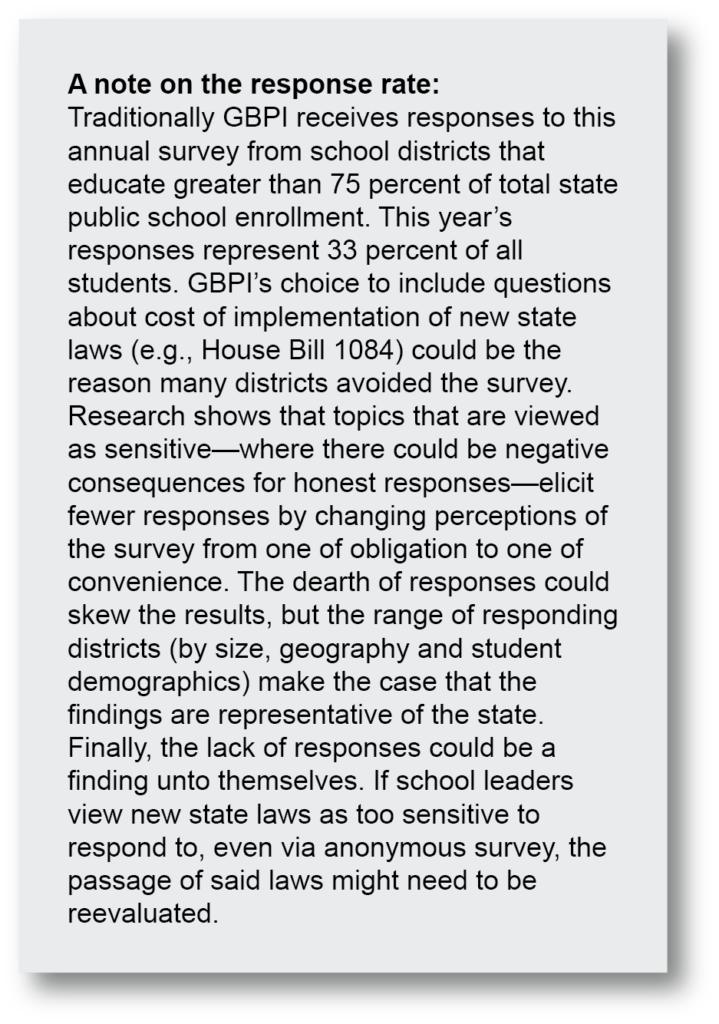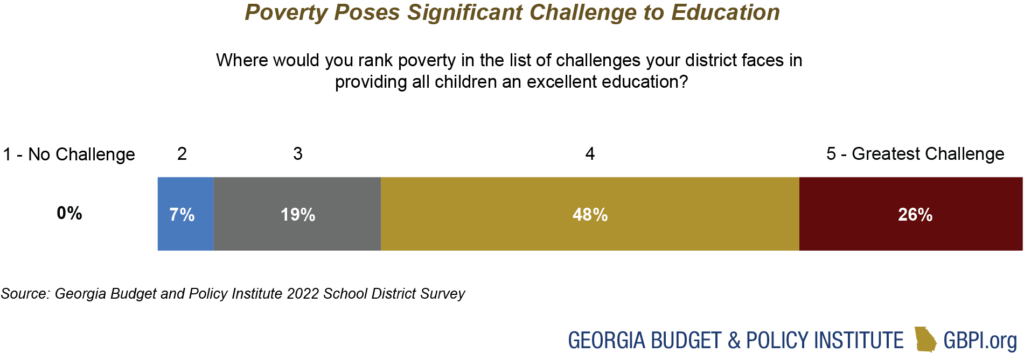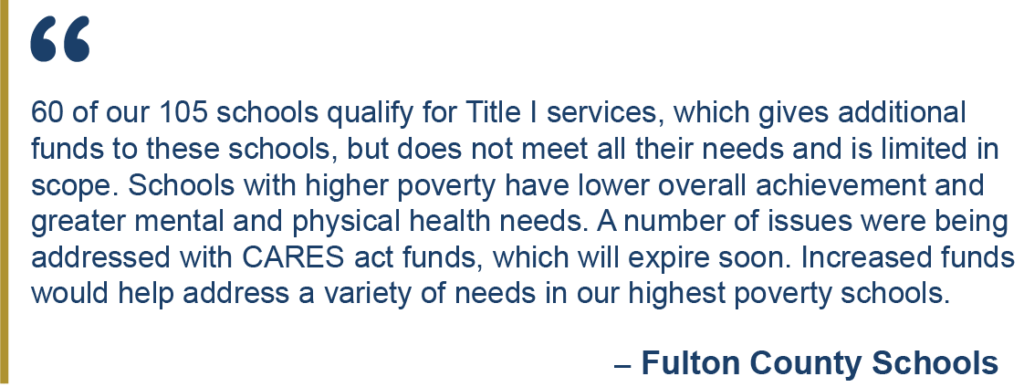This report was co-authored by Monica Obregon, a fellow in the Southern Education Leadership Initiative, a program within the Southern Education Foundation

Every year, the Georgia Budget & Policy Institute (GBPI) distributes a survey to each superintendent in the state to collect information on the effects of education funding on individual school districts, what improvements need to be made and how policymakers best support students across Georgia. This year, school superintendents or other central office staff from 31 of Georgia’s 224 school districts and individual state-authorized public charter schools responded to the survey, representing 576,000 students or one third of all public school students in the state. The participants serve a representative sample of Georgia’s children, with districts ranging vastly in size, geography and the student populations they serve.
The following report summarizes findings from the survey, focusing on four key areas: 1) school employee salaries, 2) paid parental leave, 3) parent involvement in curriculum and 4) funding to educate students living in poverty. Insights from school leaders highlight the consequences of implemented policies to K-12 public education in Georgia, critical information on school finances and under-reported impacts of state laws on public education, and the need for additional funding for specific populations.
Quotes are used throughout the report to highlight specific perspectives and common themes. Survey respondents’ names, titles and districts have been used with permission.
Employee Salaries
Governor Kemp campaigned for his first term on raising teacher pay by $5,000.[1] After an initial $3,000 increase to the state salary schedule in 2019, the General Assembly passed a budget with a $2,000 increase this year.[2] The salary schedule dictates base pay and scheduled raises based on years’ experience and credentials earned. Although the state allocates funding for salaries via the schedule, school districts have flexibility to make local decisions on salaries, including but not limited to the option to supplement pay with local property tax collections. Additionally, as state funding only makes up half of the school’s revenue on average (local and federal funding are the remainder), if a district wanted to provide raises to all teachers, then leaders would need to find the additional funding in local money.[3]

The survey asked leaders to provide their district’s base teacher pay in Fiscal Year (FY) 2022 and what it will be for the current school year (FY 2023). From the survey, the average salary for a first-year teacher with a bachelor’s degree (T4) last year was $40,911. Participants reported an average salary of $43,032 for the same position this year—an average increase of $2,120. The reported pay changes ranged from $0 to $4,150. Two districts reported no raise in salaries from last year and another two would offer raises less than $2,000. Current starting salaries, according to respondents, range from $37,217 to $52,970.
Teachers are not the only professionals that schools employ. School staff such as paraprofessionals and bus drivers/monitors are vital to a safe, high-quality education. Nearly three-quarters (74 percent) of the survey respondents reported bus driver/monitor employment shortages last year for their school districts. For those that reported annual pay, the average starting salary for bus drivers this year is $13,700. Respondents recorded an average hourly pay of $16.31. Often bus drivers and monitors are asked to work 6-hour days for the school year (approximately 180 days).

Paid Parental Leave Program
In 2021 the Georgia legislature passed House Bill (HB) 146, which offered paid parental leave to eligible state employees, including local board of education employees.[4] When asked whether their district created a parental leave policy in line with HB 146, four of the respondents (representing 13 percent of responses) indicated that they had not. Three of these four are state-authorized charter schools.

Even though lawmakers created a paid parental leave program, no funding was attached to address the cost of providing substitutes while still paying the employees. This decision left districts to pick up the bill through local funds. The issue presents itself when a district does not have the local funds to cover the cost of the paid parental leave program at 100% or when employees utilize the program without a substitute to cover the duties of the position vacancy.
Parental Involvement in Curriculum
Due to the complex nature of the system of schooling it can be hard to assess the costs associated with education legislation. Standardized testing is a good example here: the money needed to create and implement the Georgia Milestones is a fraction of the total cost of a policy that prioritizes standardized test scores in the classroom. Teacher and leader focus can be drastically shifted away from other needs in favor of the test. With this understanding, the survey asked school districts whether they anticipated new costs associated due to the implementation of three bills: HB 1084, HB 1178 and Senate Bill (SB) 226.[5] Below are the response rates for school districts anticipating costs for each bill listed.
Has/Will your district anticipate additional costs due to implementation of:
House Bill 1084, Divisive Concepts: 35 percent
“A BILL to be entitled an Act to amend Title 20 of the O.C.G.A., relating to education, so as to prevent the use of and reliance upon curricula or training programs which act upon, promote, or encourage certain concepts, with exceptions; to provide for related matters; to repeal conflicting laws; and for other purposes.”
House Bill 1178, Parents’ Bill of Rights: 45 percent
“A BILL to be entitled an Act to amend Part 5 of Article 16 of Chapter 2 of Title 20 of the O.C.G.A., relating to review of removal of students in elementary and secondary education, so as to provide for the protection of the fundamental right of parents to direct the upbringing and education of their minor children from undue infringement by a state or local government entity, local board of education, or any officer, employee, or agent thereof; to provide for appeals; to provide for construction; to prohibit certain waivers; to provide for related matters; to repeal conflicting laws; and for other purposes.”
Senate Bill 226, Distribution of Harmful Materials: 35 percent
“A BILL to be entitled an Act to amend Part 3 of Article 3 of Chapter 12 of Title 16 of the Official Code of Georgia Annotated, relating to sale or distribution of harmful materials to minors, so as to provide that the provisions of Code Section 16-12-103 shall be applicable to libraries operated by schools; to provide for related matters; to repeal conflicting laws; and for other purposes.”
Since the bills did not go into effect until July 1 of this year, the costs for the most part are unrealized. The true cost of these bills will show up as districts seek legal advice, find representation for the district in litigation and use employee time taken away from previous responsibilities—e.g., educating children. Further, it will be difficult to quantify the cost of losing employees that feel, rightly or wrongly, that unfair and uneducated attacks are being legitimized by the state legislature.

Additional Funds for Students in Poverty
Georgia is currently one of only six states that does not give schools additional money to educate students living in poverty.[6] The costs of educating students in the classroom increases when schools are also aiding in providing families with essentials.
This survey asked school districts to rank where poverty was on the list of challenges in providing children an excellent education. None of the respondents said that parental income offered “no challenge.” Approximately a quarter of respondents ranked poverty as the greatest challenge their school district is facing.

Generations of white supremacist policies have ensured that wealth and race are connected in Georgia, therefore it is impossible to talk about generational poverty without understanding racism. School leaders who have prioritized support for these students are, knowingly or not, advancing racial justice. When asked what supports these schools were providing for students in poverty, the responses went far beyond what is traditionally considered as “school support.” Schools offer rental and utility assistance; funds for groceries; full-time social workers; Wi-Fi hotspots and vision/dental exams, just to name a few. The costs for these supports range from $5,000 to over $1,000,000 a year—a significant strain on yearly budgets.
Previous attempts for lawmakers to create a grant for schools specifically to educate students living in poverty have yet to pass into law. When asked what services or support districts would focus their attention on if a grant program was created by Georgia lawmakers, district representatives gave a diversity of opinions from early reading support to mental health supports to universal free meals.


Policy Implications
Feedback from the survey underscores the real impact hidden costs have on public schools across Georgia. Failure to account for the effect of poverty, the growing needs of pupil transportation, or the true cost of a bill banning “divisive concepts” leaves schools scrambling to do more with less. The following are three clear steps that state lawmakers can take to address concerns raised in the 2022 GBPI School District Survey:
- Create an Opportunity Weight in the school funding formula to support students in poverty. Lawmakers failed to advance a bill to create such a grant (HB 10) last session.[7] The responses from this survey show school systems providing basic needs for families well beyond traditional understanding of “schooling.” Those districts without robust local property taxes either fail to offer these services or are required to pull from other areas of the school. The state needs to support all schools by recognizing this growing need within.
- Increase state investment in pupil transportation. Current inflation has the potential to decimate already meagre school transportation budgets. The needs of this legally required program increase annually while the state formula has remained practically unchanged since FY 2000.[8] Increasing state investment in this area will allow schools to raise bus driver/monitor pay, buy safer buses and lower the average route distances.
- Provide funding for paid leave. The research on parental leave suggests wide-ranging benefits for families, employers and wider society.[9] People of color specifically may benefit from these policies as they are more likely to be unable to afford to take time off after a child’s birth.[10] The passage of HB 146 is a great first step towards a strong parental leave policy and increased racial equity, but schools should not be financially punished for implementing it. Lawmakers must reimburse schools for the costs of this policy and consider expanding it further.[11]
Acknowledgements
The Georgia Budget & Policy Institute would like to thank the school districts who participated in this survey and were essential in collecting valuable insights on the status of Georgia’s schools. The thoughtful responses and honest feedback collected in the survey are greatly appreciated and will be used to advocate for policies that best support students across the state. District leaders, school leaders and educators have our respect and gratitude for the work they do each day to serve Georgia’s students and their continued commitment to public education.
Appendix: Methodology
Dr. Stephen Owens developed the survey questions. Monica Obregon, who was a Southern Education Leadership Initiative fellow placed at GBPI during the summer of 2022, distributed the survey, conducted follow-up outreach, supported respondents with any questions and analyzed the results.
The survey was sent via email to every superintendent in the state. A link to the online survey was included along with a PDF version of the same survey. GBPI representatives subsequently contacted superintendents and other central office staff via phone and email to request their participation over a period of six weeks. The survey was available between June and July of 2022. Participation was voluntary. PDF submissions were manually entered by Obregon into the online survey link, and GBPI exported a spreadsheet with all survey responses.
Endnotes
[1] Amy, J. (2022). Pay raise arrives for Georgia state employees, teachers. Fox 5. https://www.fox5atlanta.com/news/pay-raise-arrives-for-georgia-state-employees-teachers
[2] House Bill 911. (2022). https://www.legis.ga.gov/legislation/61136
[3] Based on a GBPI analysis of Georgia Department of Education (2021). School system revenues. https://financeweb.doe.k12.ga.us/FinancialPublicWeb/ReportsMenuPublic.aspx
[4] House Bill 146. (2021). https://www.legis.ga.gov/legislation/59021
[5] House Bill 1084. (2022). https://www.legis.ga.gov/legislation/61477; House Bill 1178. (2022). https://www.legis.ga.gov/legislation/61677: Senate Bill 226. (2022). https://www.legis.ga.gov/legislation/59932
[6] Education Commission of the States. (2021). K-12 and special education funding: Funding for students from low-income backgrounds. https://reports.ecs.org/comparisons/k-12-and-special-education-funding-06
[7] House Bill 10. (2021). https://www.legis.ga.gov/legislation/58795
[8] Owens, S. (2022). Three ways to fix Georgia education funding. Georgia Budget and Policy Institute. https://gbpi.org/three-ways-to-fix-georgia-education-funding/
[9] Paid Family Leave. (2021). Prenatal-to-3 Policy. https://pn3policy.org/policy-clearinghouse/2021-paid-family-leave/; Burtle, A., & Bezruchka, S. (2016).
[10] Population health and paid parental leave: What the United States can learn from two decades of research. Healthcare. https://doi.org/10.3390/healthcare4020030
[11] Owens, S. (2022). How to support Georgia’s schools post-Roe. Georgia Budget and Policy Institute. https://gbpi.org/how-to-support-georgias-schools-post-roe/#_edn13








